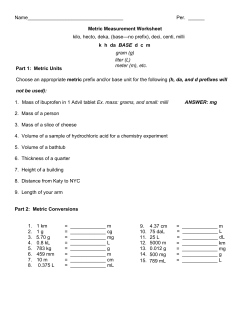
proposed special interest groups - Digital Health and Care Alliance
DIGITAL HEALTH AND CARE ALLIANCE PROPOSED SPECIAL INTEREST GROUPS DHACA Day I, July 2014 Simon Bramwell Programme Manager simon.bramwell@dhaca.org.uk 07979 513742 1 ECONOMIC AND BUSINESS MODELLING Market Need There are no sustainable economic and business models in place for either seed or sustainable funding. Linking EBM to reference architectures, commissioning and procurement systems would seem sensible within the ever changing health and care space but who, how, when will it happen? New entrants into the digital health and care sector, especially those intent on growing the consumer market, have specific requirements to understand the required market architecture, processes and their potential roles and responsibilities. Scope of SIG Identify key features of effective markets that have already been developed (including review of existing DHACA profile), understand the reasons these have yet to be picked up in NHS and Care, establish if levers are available and develop an exploitation plan to maximise the opportunities. Provide emerging digital health and care service entrants with an understanding of the current landscape, the potential market architecture that could support large-scale, sustainable consumer businesses, and the business opportunities and partnerships that would be required. Contacts: Huw Jones, Keren Down 17/03/2015 SPECIAL INTEREST GROUPS 2 INFORMATION GOVERNANCE Market Needs The current approach to information governance is the major barrier preventing interoperability between the consumer and statutory sectors. A better capability is needed for sharing data so that the information necessary for delivery of care is available and so individuals can self-care and manage their health. Many new innovations for self-care and redesign of statutory services are held back because of the emphasis on protecting data and lack of IG guidance on sharing data. Scope of SIG Define new guidance for data sharing and challenge the statutory sector to improve interoperability and data sharing between consumer and statutory sectors for continuity of care and assisted living purposes Influence commissioners to introduce data sharing and self-care outcomes Influence GPs and providers on how to implement data sharing with individuals and with other providers across a local economy Gather guiding principles from the Information Governance Alliance and consult DHACA membership on IG requirements and feedback on IG proposals Collaborate with DH and HSCIC on updating the IG toolkit to enable data sharing and introduce data sharing metrics. Contacts: Phil Stradling, Nigel Dallard 17/03/2015 SPECIAL INTEREST GROUPS 3 MEASUREMENT AND METRICS Market Needs Measure and demonstrate the effectiveness and benefits a digital health and care system, to justify investments. “Traditional” telehealth and telecare, has focused on measuring cost-avoidance, which fails to do justice to the scope, power and value of digital health and care systems. Scope of SIG Consider the needs of service stakeholders to measure programme benefits , and work on guidelines for incorporating these measures into products. Proposed initial project: Review the 6 existing NHS England TECS programme benefits categories (see below) and review how they will fit technically Primary contact: John Eaglesham Example TECS Measures to consider: 1. “Goal A:ainment Score” (GAS). 2. Secondary prevenAon metric. 3. Primary prevenAon metric. 17/03/2015 4. Service uAlisaAon metric. 5. Social impact metric. 6. Economic impact metric. SPECIAL INTEREST GROUPS 4 MEDICAL APPs Market Needs There remains fear, uncertainty and doubt in all stakeholder groups that develop, sell, purchase or use medical apps. Combined with a lack of cost effectiveness measures for this software, this FUD is significantly holding back the deployment of medical devices, principally by making GPs unwilling to recommend them to patients as a viable alternative to drug use. Scope of SIG Develop a freely-available road map from app coding through to patient use, to help clarify the steps necessary in between, plus individual more detailed sheets e.g. on what GPs need to be aware of when recommending an app; Assist in promoting the DHACA case, already being pushed, for NICE’s remit to be enlarged to include medical software. Contact: Charles Lowe 17/03/2015 SPECIAL INTEREST GROUPS 5 PROCUREMENT Market Needs Classic procurement of remote monitoring hardware is an extremely time-, and resource-, consuming activity that rarely results in the best product being procured. The change to procuring services, and the dematerialisation of much of the hardware required for remote monitoring delivers a great opportunity to change the way Scope of SIG Members support the digital health and care programmes (such as TECS) by identifying the best way for public bodies to procure remote monitoring services in order to promote responsiveness to changes in demand and result in cost-effective delivery. Where changes in regulation are within the ambit of the UK government to effect, the group may wish to recommend there. Contact: Charles Lowe 17/03/2015 SPECIAL INTEREST GROUPS 6 REFERENCE ARCHITECTURES Market Needs A common technical framework for interoperable digital health and care ecosystems, allowing the various stakeholders to develop systems, APIs, etc., once, and to interconnect their systems according to business requirements with as few technical barriers as possible. Scope of SIG Review existing DHACA Reference Architecture (as described in profile), and modify as required to provide technical underpinning for DHACA Ecosystem Models (as described in EBM profile). Develop architecture further, both in scope (if necessary) and in technical detail. Primary Contact: Nigel Dallard 17/03/2015 SPECIAL INTEREST GROUPS 7 SELF-CARE STRATEGY Market Needs The market for self-care services within a local economy needs a channel strategy to ensure maximum adoption of self-care services by those people who could benefit from self-care. This will also encourage new channel innovations and scale-out of channel capacity within a local economy. Scope of SIG A channel strategy will enable both the transition of people in and out of selfcare services. Existing GP, hospital and social care providers will use step-down channels for moving patients into self-care. In addition, channels will be identified to refer people into self-care who have some form of unmet need for health and care services. Equally, the channel strategy will explore transitions from self-care back into statutory services where circumstances and needs change. Primary contact: Phil Stradling 17/03/2015 SPECIAL INTEREST GROUPS 8 STEP-UP / STEP-DOWN STRATEGY Market Needs The emerging market of technology enabled care services needs a channel strategy so that existing referral channels are incentivised and enabled to refer people to step-up/step-down services, and so new channels are encouraged such as health champions in the voluntary sector and online self-referral channels. Scope of SIG Influence commissioners to introduce a channel strategy for step-up/step-down services consisting of direct and indirect channels Provide guidance to commissioners and providers on the targets, tools and incentives to make the channel strategy efficient and effective Primary Contact: Phil Stradling For condiNons such as diabetes and COPD, referrers such as GPs & hospitals need to become part of a channel strategy where they are given targets, tools and incenNves to refer people to step-‐down services. For people at risk such as those who are obese or frail a channel strategy is needed to refer people to step-‐up services. This could involve a direct referral or an intermediary provider to assess needs and to advise on referral. 17/03/2015 SPECIAL INTEREST GROUPS 9 SCALEABILITY Market Needs As most sales of healthcare technology in the UK market continue to be small, insufficient attention is often paid to designing scalability into both the technical and operational elements of the technology in order to enable service provision that works as well at 10 users as one million. Scope of SIG To look at both the technical and operational aspects of health technology scalability to produce a set of guidelines to use at the design stage to help developers design for optimal scalability. Primary Contact: Charles Lowe SPECIAL INTEREST GROUPS 10 MENTAL HEALTH CARE (“SILVERBOOK”) Market Needs There is no standard for a mental health care record that could drive the development of apps to help patients and their carers cope with dementia and other mental health conditions. There is a need for those professional and academic bodies looking to improve care for mental health patients through better use of digital services and data to coordinate their efforts to define a standard for self-care and managed self-care. Scope of SIG Define the key features for a new standard for an electronic Personal Dementia Care Record (ePDCR). This standard could include definition of: care settings, actors, data sets, data standards, connectivity and interoperability across care settings, principles for data ownership by patients of their ePDCR etc. Set up an advisory group to oversee the development of the ePDCR standard Collaborative with industry and professional bodies to drive apps and solutions to support the ePDCR standard Primary Contact: Phil Stradling SPECIAL INTEREST GROUPS FURTHER PROPOSALS? Simon Bramwell Programme Manager simon.bramwell@dhaca.org.uk 07979 513742 17/03/2015 SIG: ________________________ Market Needs Scope of SIG Primary Contact: 17/03/2015 SPECIAL INTEREST GROUPS For more information contact: charles.lowe@dhaca.org.uk
© Copyright 2025













